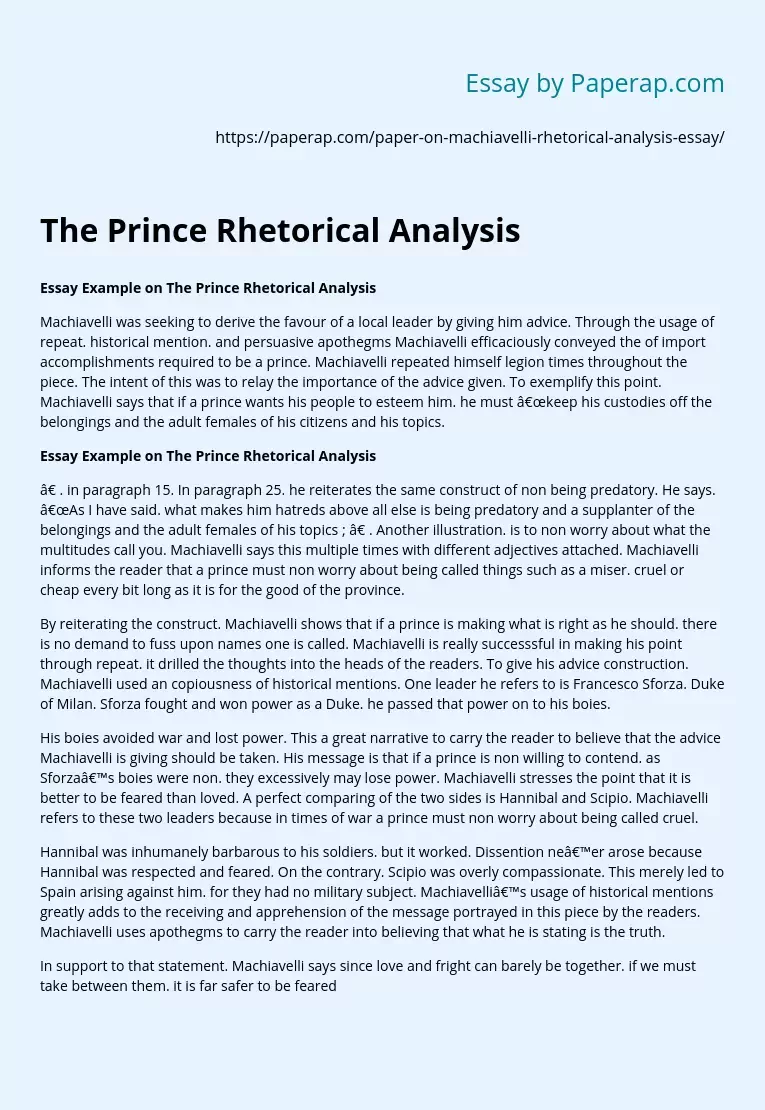The Prince Rhetorical Analysis
Machiavelli was seeking to derive the favour of a local leader by giving him advice. Through the usage of repeat. historical mention. and persuasive apothegms Machiavelli efficaciously conveyed the of import accomplishments required to be a prince. Machiavelli repeated himself legion times throughout the piece. The intent of this was to relay the importance of the advice given. To exemplify this point. Machiavelli says that if a prince wants his people to esteem him. he must “keep his custodies off the belongings and the adult females of his citizens and his topics.
In paragraph 25. he reiterates the same construct of non being predatory. He says. “As I have said. what makes him hatreds above all else is being predatory and a supplanter of the belongings and the adult females of his topics ; ” . Another illustration. is to non worry about what the multitudes call you. Machiavelli says this multiple times with different adjectives attached. Machiavelli informs the reader that a prince must non worry about being called things such as a miser.
cruel or cheap every bit long as it is for the good of the province.
By reiterating the construct. Machiavelli shows that if a prince is making what is right as he should. there is no demand to fuss upon names one is called. Machiavelli is really successsful in making his point through repeat. it drilled the thoughts into the heads of the readers. To give his advice construction. Machiavelli used an copiousness of historical mentions. One leader he refers to is Francesco Sforza.
Duke of Milan. Sforza fought and won power as a Duke. he passed that power on to his boies.
His boies avoided war and lost power. This a great narrative to carry the reader to believe that the advice Machiavelli is giving should be taken. His message is that if a prince is non willing to contend. as Sforza’s boies were non. they excessively may lose power. Machiavelli stresses the point that it is better to be feared than loved. A perfect comparing of the two sides is Hannibal and Scipio. Machiavelli refers to these two leaders because in times of war a prince must non worry about being called cruel.
Hannibal was inhumanely barbarous to his soldiers. but it worked. Dissention ne’er arose because Hannibal was respected and feared. On the contrary. Scipio was overly compassionate. This merely led to Spain arising against him. for they had no military subject. Machiavelli’s usage of historical mentions greatly adds to the receiving and apprehension of the message portrayed in this piece by the readers. Machiavelli uses apothegms to carry the reader into believing that what he is stating is the truth.
In support to that statement. Machiavelli says since love and fright can barely be together. if we must take between them. it is far safer to be feared than loved. He goes on to back up his advice by saying that in times of war. your “friends” will turn away. The manner Machiavelli phrases this sentence followed by his support. leads the reader to believe there is no possible manner he could be lying. Besides. Machiavelli advices that a prince should larn how to populate by concealed fraudulence. for past princes have been successful from cognizing how to pull strings the heads of work forces by being malicious.
At the terminal of paragraph 19. he says “… and in the terminal they have surpassed those who laid their foundations upon candidly. ” By using that honestness will go forth you in the dust compared to princes who deceit his topics by looking to maintain his word. Machiavelli accomplishes doing the reader believe his advice is true. Machiavelli conveyed the of import accomplishments of being a leader in The Prince through advice successfully by the usage of repeat. historical mentions. and persuasive apothegms to efficaciously convey his message.
The Prince Rhetorical Analysis. (2019, Nov 27). Retrieved from https://paperap.com/paper-on-machiavelli-rhetorical-analysis-essay/

